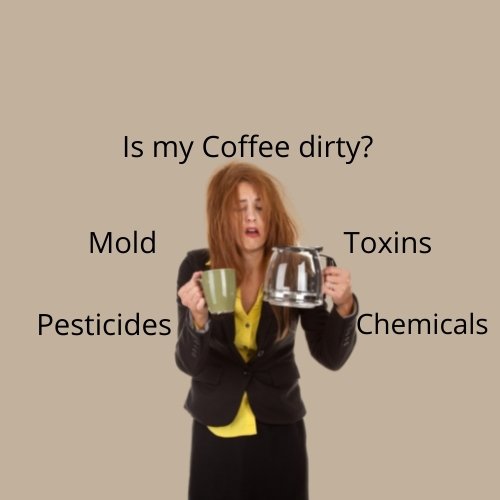You may think that your cup of coffee may seem innocent, but it’s likely hiding a myriad of mold, toxins, and pesticides. Many conventionally grown coffee contains health-harming contaminants like Ochratoxin A, Acrylamide, Polycyclic Aromatic Hydrocarbons, Yeast, and Pesticides. They can not only cause short term symptoms like fatigue, weakness, and brain fog, but lead to long-term health consequences like cancer, neurodegenerative diseases, and more.
Ochratoxin A-
The US Government classified and categorized Ochratoxin as a possible carcinogen and as a mycotoxin.
It can damage your DNA and significantly compromise your immune system, potentially leading to liver cancer, kidney cancer, and neurodegenerative diseases such as Alzheimer’s and Parkinson’s. Some of the first signs of mold exposure are fatigue, weakness, and sinus infections.
Mold causes oxidative stress in the body, which impairs mitochondrial function, and disrupts protein synthesis. This can lead to a variety of symptoms like memory problems, brain fog, Chronic Fatigue Syndrome, night sweats, dizziness, and even hair loss.
Aflatoxin B1-
This toxin is known as the most potent natural carcinogen and as a mycotoxin. It primarily occurs during the pre-harvesting stage of coffee bean farming, but also can form in the storing and processing stages.
Aflatoxins has been linked to liver cancer in humans, and a study on peanut factory workers exposing to dust contaminated with Aflatoxin B1 showed a link to respiratory cancer and total cancer compared to workers who weren’t have an exposure.
- Select high-quality coffee beans that are specialty grade and organically grown.
Acrylamide
The US Government classifies also Acrylamide as a probable human carcinogen and has also been shown to be a neurotoxin that can damage nervous system function.
In coffee specifically, acrylamide is formed in the beginning of the roasting process, but as the beans continue to roast, it breaks down. This means medium and dark roast beans are the safer choice.
Acrylamide forms in starchy foods when heating to 250ºF or more.
You can avoid acrylamide in coffee, opting for medium or dark roasts. Also choosing organic Arabica beans over Robusta beans.
To lower the cost of coffee, many roasters mix Arabica beans with Robusta beans. You should always choose 100% Arabica coffee.
PAH: Polycyclic Aromatic Hydrocarbons in Coffee
PAHs are classified as probable carcinogens by the US government and short term exposure to PAHs is linked to cancer.
When it comes to coffee, PAHs are created when coffee is roasting at high temperatures for long periods of time. Unfortunately, this means that strong dark roasts commonly contain higher levels of PAH.
To reduce your exposure to PAHs, choose a medium or dark roast beans.
Also Yeast in Coffee?
Yes, yeast has an association in fermentation process, such as chocolate, wine, beer and coffee. In coffee in particular, people believes that yeast strains play a critical role in the creating a bean’s distinctive taste and smell.
In addition to creating a flavorful bean, the roasting process also serves as a ‘kill step,” with the goal of killing any pathogens (including yeast) in contaminated green coffee.
If your coffee contains high levels of yeast, there are 2 primary reasons:
Poor handling practices at the roastery or
Cross contamination with yeast-containing green (unroasted) coffee.
Yeast may be dangerous for people suffering from allergies and sensitive immune systems. Especially for those with immune conditions, exposure to yeast can cause an imbalance in the gut microbiota and lead to changes in the T-cells, the cells that help in the immune response, causing inflammation.
Pesticides : the use in conventional crops!
Today only 3% of coffees available worldwide are grown using organic methods. This means that 97% are treated with pesticides and other chemicals.
Many countries have few to no regulations on the use of pesticides and chemicals on food products. In fact, some actually use chemicals to treat coffee that have been banned in the US and Europe.
People think that the roasting process destroys pesticides. But research now suggests that these chemicals actually penetrate the green coffee bean. Because of this, roasting often fails to eradicate the contamination, which can result in pesticide residue in coffee even after it’s been brewed.
What causes pesticide use?
The use of pesticides in food or drink can cause several diseases:
Breast and other cancers such as ovarian and prostate cancer.
Birth defects
Fertility issues
Respiratory diseases
Damage to immune system
Alzheimer’s and Parkinson’s disease etc..
What you can do to avoid pesticides in your coffee?
Always be sure to purchase coffee grown using organic methods.
In conclusion What You have to do?
First of all to choose high-quality coffee beans.
At Café Santa Helena you will found our specialty grade coffee, organically grown Arabica coffee beans, single origin, hand picked, from organic and Fairtrade plantations in the mountains of the state of Minas Gerais in Brazil.
Our coffee beans are stored in temperature-controlled warehouses to prevent mold growth.
The Coffee is roasting in a medium and dark roast in a smokeless wood machine by hand.
Coffee beans contains up to 150% more antioxidants than other coffee brands.
Café Santa Helena is quickly packaging in a recyclable, BPA-free bag to ensure that you experience the special aroma and flavor of fresh roasting coffee with every cup.
We give you the healthiest, most flavorful cup of coffee you’ve ever had! Try it !
Grains for espresso machine, Ground for Moka, filter or similar. Capsules Espresso or Lungo, compatible to Nespresso-system machines.



